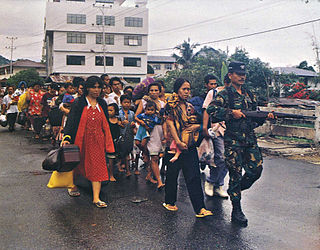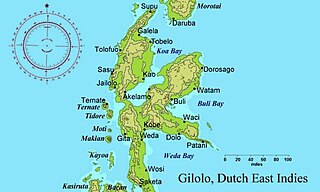
The Bacan Islands, formerly also known as the Bachans, Bachians, and Batchians, are a group of islands in the Moluccas in Indonesia. They are mountainous and forested, lying south of Ternate and southwest of Halmahera. The islands are administered by the South Halmahera Regency of North Maluku Province. They formerly constituted the Sultanate of Bacan.

North Maluku is a province of Indonesia. It covers the northern part of the Maluku Islands, bordering the Pacific Ocean to the north, the Halmahera Sea to the east, the Molucca Sea to the west, and the Seram Sea to the south. It shares maritime borders with North Sulawesi, Southeast Sulawesi and Central Sulawesi to the west, Maluku to the south, Southwest Papua to the east, and Palau and the Philippines to the north. The provincial capital is Sofifi, mostly part of the city of Tidore Islands on the largest island of Halmahera, while the largest city is the island city of Ternate. The population of North Maluku was 1,038,087 in the 2010 census, making it one of the least-populous provinces in Indonesia, but by the 2020 Census the population had risen to 1,282,937, and the official estimate as at mid 2023 was 1,328,594.

The Sultanate of Ternate, previously also known as the Kingdom of Gapi is one of the oldest Muslim kingdoms in Indonesia besides the sultanates of Tidore, Jailolo, and Bacan.

The Sultanate of Bacan was a state in Maluku Islands, present-day Indonesia that arose with the expansion of the spice trade in late medieval times. It mainly consisted of the Bacan Islands but had periodical influence in Ceram and the Raja Ampat Islands. It fell under the colonial influence of Portugal in the 16th century and the Dutch East India Company (VOC) after 1609. Bacan was one of the four kingdoms of Maluku together with Ternate, Tidore and Jailolo, but tended to be overshadowed by Ternate. After the independence of Indonesia in 1949, the governing functions of the sultan were gradually replaced by a modern administrative structure. However, the sultanate has been revived as a cultural entity in present times.

North Halmahera Regency is a regency of North Maluku Province, Indonesia. It was declared a separate Regency on 25 February 2003, formed from part of the former North Maluku Regency. The capital town of the regency lies at the port of Tobelo. The Regency, which was considerably reduced by the separation of Morotai Island to form a separate regency on 26 November 2008, now covers an area of 3,404.27 square kilometres (1,314.40 sq mi) and had a population of 161,847 people at the 2010 Census, 179,783 at the 2015 Intermediate Census. and 197,640 at the 2020 Census. The official estimate as at mid 2023 was 203,213. The principal settlements are Tobelo, Kao and Galela. The area is noted for its white beaches and coral reefs.
Ternate is a language of northern Maluku, eastern Indonesia. It is spoken by the Ternate people, who inhabit the island of Ternate, as well as many other areas of the archipelago. It is the dominant indigenous language of North Maluku, historically important as a regional lingua franca. A North Halmahera language, it is unlike most languages of Indonesia which belong to the Austronesian language family.
Tabariji or Tabarija was the Sultan of Ternate in Maluku, whose realm also included Makian and other east Indonesian islands. He reigned from 1533 to 1535, when he was deposed by the dominant Portuguese and exiled to India. He later became a convert to Catholicism under the name Dom Manuel.

Jailolo is a town and former sultanate on Halmahera in Indonesia's Maluku Islands. It is located on the island's west coast approximately 20 km north of Ternate. Jailolo is a small port that serves Halmahera's northwestern coastal villages.

The Maluku sectarian conflict was a period of ethno-political conflict along religious lines that occurred in the Maluku Islands in Indonesia, with particularly serious disturbances on the islands of Ambon and Halmahera. The duration of the conflict is generally dated from the start of the Reformasi era in early 1999 to the signing of the Malino II Accord on 13 February 2002.

Fort Tolukko is a small fortification that was erected in 1522 on the east coast of Ternate facing Halmahera. It was one of the colonial forts built to control the trade in clove spices, which prior to the eighteenth century were only found in the Maluku Islands. It has been variously occupied by the Portuguese, the native Ternate Sultanate, the Dutch, the British and the Spanish. It was abandoned as a fort in 1864, renovated in 1996, and is now a tourist attraction.

Mudaffar Sjah II was the 48th Sultan of Ternate from 1975 until his death. Although his position as monarch was ceremonial rather than executive, he was a prominent local politician whose career was temporarily interrupted by sectarian violence in 1999.
Sultan Hairun Jamilu was the 6th Muslim ruler of Ternate in Maluku, reigning from 1535 to 1570. During his long reign, he had a shifting relation to the Portuguese who had a stronghold in Ternate and tried to dominate the spice trade in the region. This ended with his assassination at the hands of a Portuguese soldier in 1570.
Sultan Mudafar Syah I, also spelt Muzaffar Syah, was the ninth Sultan of Ternate who ruled from 1606 to 1627. He reigned during an important transitional phase, when the Dutch East India Company gained ascendency in the Maluku Islands and began to regulate the commerce in spices. This was the beginning of the colonial subordination of Maluku that would accelerate during his successors.
Sultan Hamza was the tenth Sultan of Ternate in the Maluku Islands. He ruled from 1627 to 1648, during a time when the Dutch East India Company (VOC) increasingly dominated this part of maritime Southeast Asia, and the increasing power of the Makassar kingdom threatened the Ternatan possessions.
Sultan Saidi was the tenth Sultan of Tidore in Maluku islands. He was also known as Magiau, and ruled from 1640 to 1657. His reign saw intermittent hostilities with Tidore's traditional rival, the Sultanate of Ternate, which included interference in an anti-Dutch rebellion in Ternate and Ambon and attempts to increase Tidorese territory in Maluku. By the time of Saidi's reign Tidore had gained a political position in parts of the Papuan territories.

The Sultanate of Jailolo was a premodern state in Maluku, modern Indonesia that emerged with the increasing trade in cloves in the Middle Ages. Also spelt Gilolo, it was one of the four kingdoms of Maluku together with Ternate, Tidore, and Bacan, having its center at a bay on the west side of Halmahera. Jailolo existed as an independent kingdom until 1551 and had separate rulers for periods after that date. A revivalist Raja Jailolo movement made for much social and political unrest in Maluku in the 19th century. In modern times the sultanate has been revived as a symbolic entity.
Sultan Haji Djafar Syah was the titular Sultan of Tidore from 1999 to 2012. He was the 36th ruler of the island kingdom according to traditional reckoning, and revived the sultanate as a cultural institution after a long vacancy since 1967. The beginning of his term was turbulent since it coincided with the Maluku sectarian conflict in 1999–2001. However, Tidore Island was largely spared from the violence.

The Pasukan Kuning, were the personal traditional army of the Sultan of Ternate, then governor of North Maluku province, Indonesia. It was founded by Mudaffar Syah in Late 1999, it was defeated and dissolved on 28 December 1999 during the Tidore-Putihan invasion of Ternate.














